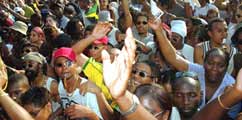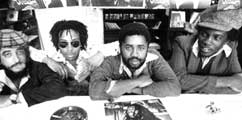Imagine Jamaica at the end of
the 1950s, already gripped by Independence fever as the new
nation prepares for the lowering of the flag in 1962. In
downtown Kingston the sound systems are booming and
competition for the freshest tunes is ferocious. Of course the
imported sounds of American rhythm & blues won’t satisfy
these souls, so, at about that time, the coming of an
indigenous Jamaican music for the masses was
inevitable.
But this celebratory combination of
nationalism and commercialism had another powerful element –
Africa. Religion, in the form of Pocomania, and the drum music
traditions of Burru and Kumina survived transportation to be
embraced in Jamaica where Africanism was clung to fiercely and
slave revolts were far more commonplace than on any other
Caribbean island. Much later, Rastafari’s sophisticated drum
ensembles would provide a living example of these ancient
traditions, while the burgeoning music industry was never slow
to absorb those influences.
Add to this a generation
of classically-trained musicians, who had embraced bebop
jazz’s sense of adventures, and crowds who just want to dance
and it’s little wonder that this tiny island – a population
half the size of London’s – has become such a force in global
music.
Music is not Jamaica’s only gift to the world,
but it is how so many Jamaicans chose to define themselves.
People will talk about how music and singing lifted the
spirits through slavery and colonialism as well as being a
weapon against political corruption and civil disorder. It
gave the poor people a voice and something to call their own,
celebrated the joys of life on the tropical island and spread
One Love throughout the world.
For fifty years, the
natural medium for this music has been the sound system
dances, with, traditionally, commercial recordings and release
schedules playing second fiddles to these awesome
ghetto-centric situations. Thus, for as long as there’s been
Jamaican music it’s remained inseparable to the people and the
environment responsible for it. Reggae remains one of the
world’s last genuine folk musics.
|

